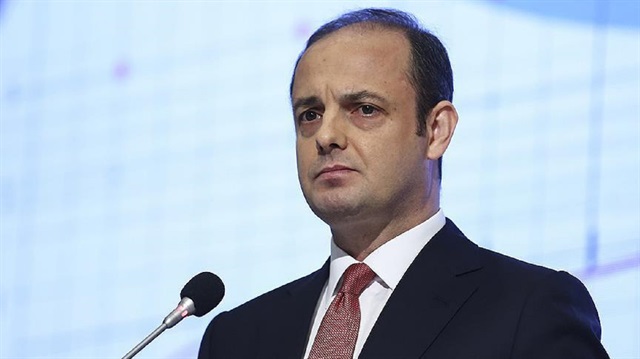
Factors affecting Turkey's high inflation will be closely monitored, and the impact of the Turkish Central Bank's monetary policy on inflation will grow more noticeable in the coming months, the bank's Governor Murat Çetinkaya said on Sunday.
"The bank's tight monetary policy stance will be maintained decisively to ensure alignment of the inflation outlook with our targets," Çetinkaya told Anadolu Agency after attending annual meetings of the International Monetary Fund and World Bank in Washington D.C.
"We expect the inflation rate, starting in the end of 2017, to gradually decelerate," he added.
At the meeting in Washington, he said: "Mainly we explained the reason for high inflation over the year, and the monetary policy measures taken by the Central Bank.”
Consumer prices in Turkey rose 11.20 percent in September compared to the same month last year, according to the Turkish Statistical Institute (TurkStat).
Since the beginning of this year, annual inflation saw its lowest level in January -- 9.22 percent -- and hit its peak, 11.87 percent, in April.
The government aims to reach 5 percent inflation in 2020, down from 8.5 percent in 2016, and inflation is predicted to be at 9.5 percent by the end of 2017, in line with the country's medium-term program announced on Sept. 27.
"The Turkish economy has proved incredibly resilient many times in recent years," Çetinkaya said. "The economy has continued to grow despite various shocks."
The economy was hit by concurrent shocks in recent years such as geopolitical tensions, global shocks, security-related issues, and last year’s defeated coup attempt.
But Turkey’s growth momentum has led several international economic institutions, multinational financial firms, and global investment banks to revise their forecasts over the last three months after its economy grew 5.2 percent in the first quarter and 5.1 percent in the second quarter.
"Contrary to previous growth periods, high economic growth in recent years did not lead to a significant deterioration in the external accounts,” Çetinkaya said.
He cited strong foreign demand, the market flexibility of exports, development of the real effective exchange rate -- which hovers at historically low levels -- credit extension designed to support production more than consumption, and the ongoing recovery in tourism that supports economic growth and external balance.
"The continued recovery in global trade indicates Turkish exports continue to contribute positively to economic growth," Cetinkaya said.
Turkey’s share of world exports has been rising steadily, from under 0.90 percent in 2015 to 0.92 percent in 2017, according to the World Trade Organization.
Cetinkaya said the bank's calculations show that the effect of exchange rate movements on inflation is longer than a year. Exchange rate movements in Turkey that have taken place since the last quarter of 2016 continue to have an impact on current inflation, but in practice this delay may vary depending on seasonal factors.
“There was also a significant expansion in loans in 2017. This means that the effect of monetary policy on the economy takes longer than the normal time," Cetinkaya said.
The U.S. dollar/Turkish lira exchange rate, which saw a sharp hike in 2016 after the defeated coup attempt, stood at 3.6350 on Sunday.
The bank kept rates steady for the third straight meeting on Sept.14, with its late liquidity window -- the highest of the multiple instruments it uses to set policy -- at 12.25 percent and its benchmark repo rate at 8 percent.
Cetinkaya underlined the role of structural factors in the higher-than-targeted inflation realization and the price volatility of certain products.
"Since 2016, we have been working on structural issues in strong coordination with stakeholders. Prominent examples are the food committee and the management of the exchange rate risk of the real sector.
“We believe this strategy will bring lasting results in the middle and long term for our ultimate target of price stability," he said.
The country's food committee aims to establish an early warning system to facilitate the close monitoring of supply and demand developments in food products and taking timely actions.
The committee also aims to enforce foreign trade mechanisms when necessary, also taking into account sectoral balances; introducing arrangements to improve competitive conditions in the wholesale and retail food markets; and taking logistical measures to diminish losses and develop efficient agricultural financing.














